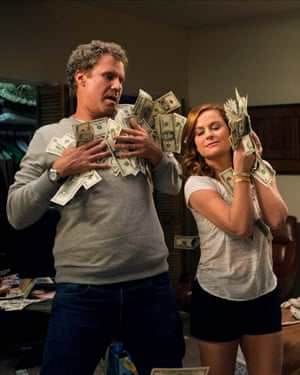The keg party's over: why gross-out comedies are going down the pan | Film
Before it landed in cinemas last month, the smart money would have been on gambling farce The House as a hit. All the elements of recent comedy successes were there: a zany premise (parents try to pay off their daughter’s tuition fees by opening an illegal casino in their friend’s living room); two well-liked leads in Will Ferrell and Amy Poehler; a ribald, outrageous tone; and some appealingly anarchic set-pieces â€" who could resist the prospect of watching Jeremy Renner being rolled up in a carpet and set alight?
But resist it audiences did. Most cinemagoers opted instead for the speed-demon thrills of Baby Driver or the unstoppable might of Wonder Woman. On its opening weekend The House grossed a measly $9m in US cinemas, against a budget of $40m. Three weeks later, it still hasn’t come close to earning back that budget.
If The House had been the only comedy to bomb at the US box office, its failure might have easily been explained away, the victim of negative reviews or a weak promotional push from its studio. But the film is by no means the year’s only comedy flop. There have been tons â€" from Dwayne Johnson and Zac Efron’s limp Baywatch remake, to Amy Schumer’s kidnap comedy Snatched, to the Scarlett Johansson-starring Rough Night. Of those, only Baywatch has come close to being regarded as anything other than a disaster â€" its figures propped up by success in Hasselhoff-loving Germany.
So why is comedy emptying out the multiplexes in 2017? It’s true that all of these movies have been greeted with varying degrees of critical disdain, but plenty of terrible comedies have raked in the earnings in recent times (as anyone who has had to sit through Adam Sandler’s Grown Ups films will attest). So perhaps we are witnessing something more seismic.

For the last 10 to 15 years a single sensibility has dominated big-screen comedy, what Variety’s chief film critic Owen Gleiberman calls the “comedy of outrageâ€. The hallmarks of this sensibility will be familiar to anyone who has seen a mainstream comedy in the last decade: its creators and stars frequently come from the Saturday Night Live school of the early to mid-00s (Ferrell, Poehler, Andy Samberg, Kristen Wiig) or the Judd Apatow stable (Seth Rogen, Jason Segel, Evan Goldberg); its heroes are usually sex-obsessed man-children â€" although in recent years women have got in on the act, with Bridesmaids and the films of Melissa McCarthy; and its tone is loud, loose and almost always very bawdy. Some of these comedies have been very good â€" Knocked Up, the 21 Jump Street films, The Hangover â€" and some have been very bad â€" Seth Rogen and James Franco’s notorious North Korea satire The Interview, The Hangover 2 and 3 â€" but the vast majority ha ve proved popular with cinemagoers.
Now though, after a decade and a half of dominance, there’s a sense that the joke is wearing thin. “Over-the-top behaviour has been fuelling comedy for a long time,†says Gleiberman. “But it feels like people are growing a little weary of that. It was really funny when Will Ferrell ran around shirtless in the first eight movies he did that in, but then it ceased being funny.â€
Megh Wright, editor of comedy website Splitsider, agrees that audience fatigue may be a factor. “It’s hard to make people laugh, and people will call bullshit if they think, ‘Hey, I’ve seen this movie before. I’ve seen these exact same jokes.’†What’s more, says Wright, in a climate where streaming platforms are luring audiences away from cinemas, there’s a sense that audiences are waiting to see comedies on Netflix or Amazon, where the risk of it being not very good matters far less. “All the franchises, with their big special effects and sense of spectacle, they require you to see them in the cinema,†she says. “With a dumb comedy, it’s easier to just hang out on your couch at night and watch it.â€
At the same time, there’s a feeling that people might be getting their laughs elsewhere. In recent years the superhero movie has largely ditched its brooding tone in favour of something lighter and funnier: witness the exuberant comedy of Guardians of the Galaxy or Spider-Man Homecoming, which features the current doyen of TV comedy, Atlanta’s Donald Glover. Blockbusters like Baby Driver, for example, or even the Fast and Furious films have brought in more gags. Everywhere you look, someone’s wisecracking.
“We’re living in an ‘all comedy, all the time’ culture,†says Gleiberman. “It’s taken over commercials, it’s taken over current affairs â€" we get our news from comedians like John Oliver. Our action films are comedies. Our Marvel movies are comedies. Comedy is the air we breathe, and in that sense when you go to see a movie that’s just a comedy, that does nothing but trying to make you laugh, it feels thin.â€
Simply being funny is not enough these days, there has to be something more. It’s notable that one of this year’s comedy successes is The Big Sick. Written by the Pakistani-American comedian Kumail Nanjiani, who also stars, and his screenwriter wife Emily V Gordon, the film is a loose retelling of the pair’s romance, which had to overcome first the disapproval of Nanjiani’s devout parents, who wanted him to enter an arranged marriage with a Muslim woman, and then the rare illness that left Gordon in a coma.
Knitting together a traditional romcom premise with thoroughly contemporary themes, The Big Sick has landed on something distinct from the rest of the comedies released this year. (Though it should be noted that the film isn’t entirely detached from the “outrage comedy†pack: its producer is one Judd Apatow.) A hit with audiences and critics, after a successful limited run, the film went into wide release across the US, a highly unusual move for a small-budget indie comedy.
Michael Showalter, who directed The Big Sick, credits the film’s success with its desire to do something different. “I think people appreciate the fact that it’s clearly not something built in a laboratory by a studio, that the cast doesn’t look like every other movie that comes out,†he says. “There’s also a lot in this story for people to relate to, whether it’s relationships or family or sickness or issues of race and religion and identity.â€

Certainly, The Big Sick’s account of interracial relationships is a world away from the keg-chugging blokeishness that dominated the Ferrell-era of big-screen comedy â€" Steve Carell having his chest waxed in The 40-Year-Old Virgin, the wrestling matches in lube-filled paddling pools in Old School. That the white male orthodoxy might finally be giving way to new stories from diverse groups can only be a good thing. On TV, this opening up of comedy to new voices has already borne fruit, with a crop of shows that are addressing hot-button topics â€" police brutality on Atlanta and the family sitcom Black-ish, “whitewashing†in film and TV on Aziz Ansari’s Netflix series Master of None. Might more film comedies start moving down the same path?
If it feels as if there is a tectonic shift underway in comedy â€" away from dick jokes and towards something more smart, relevant and socially conscious â€" it may be to do with the current occupant of the White House. As the virality of late-night TV monologues and SNL skits shows, there’s been a craving for a more politically aware strand of comedy since Trump took office. That’s a problem for the film industry, whose long production schedules make it hard to move with the times.
“These movies that have failed were made before the elections,†says Wright. “So maybe that’s part of it. Maybe people who are worried about losing healthcare or the Muslim bans or Russia don’t want to go and watch a bunch of comedians party.â€
For Showalter, whatever comes next in comedy needs to wrestle with “what the world we live in looks like right now. People are afraid, people are angry, and I’m pretty sure it’s like this in the UK as well. We wake up thinking about it and we go to sleep thinking about it. And comedians are no different. So to make comedy that is ignorant of that, that has its head in the sand, I just don’t think it’s going to fly. But I don’t know what that means, and I don’t know what form that takes.â€
One thing’s for certain â€" it probably won’t feature Will Ferrell running about with his shirt off.

0 Response to "The keg party's over: why gross-out comedies are going down the pan | Film"
Posting Komentar